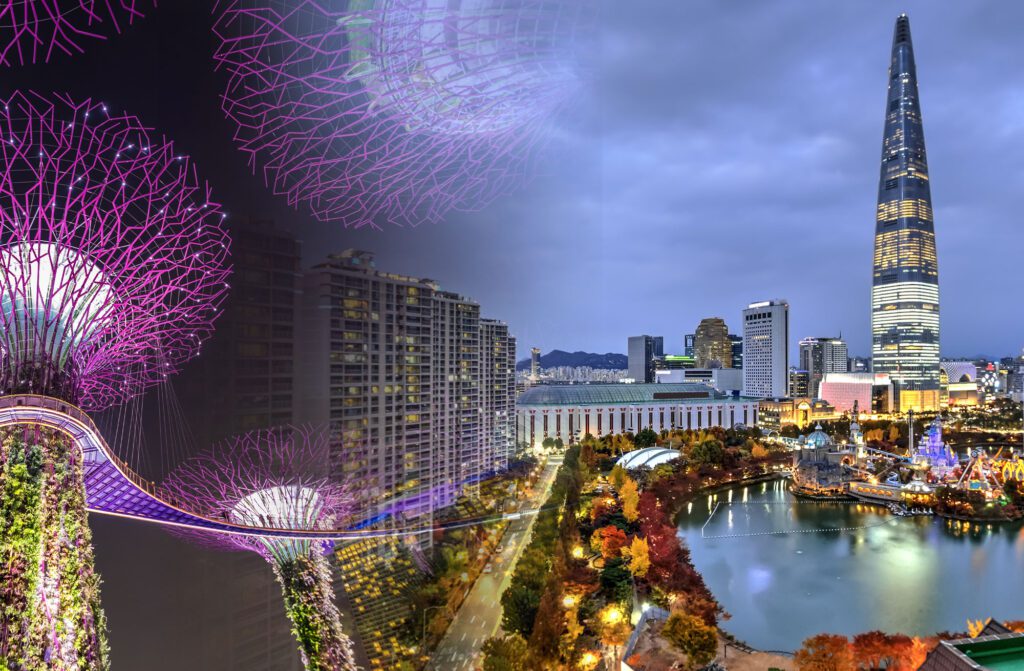

In today’s global economy, businesses seek growth in diverse markets, with Singapore and South Korea emerging as top choices in the Asia-Pacific. Both countries offer robust economies, advanced infrastructure, and favorable business climates. However, navigating their intricacies demands a nuanced understanding of cultural, legal, and economic landscapes. In this article, we provide an analysis of doing business in Singapore vs Korea, offering strategic insights for entrepreneurs, investors, and corporations. From regulatory frameworks to cultural nuances, we highlight key factors shaping business operations, aiding stakeholders in maximizing opportunities in these dynamic markets.
Startup Environments
Both Singapore and South Korea are vigorously vying to attract startups through a plethora of incentives, grants, and tax breaks while continually expanding their rosters of accelerators, incubators, and venture capital firms. Among Singapore’s offerings is the K-Startup Centre, established in collaboration with South Korea’s Ministry of SMEs and Startups, Enterprise Singapore, and NUS Enterprise in 2022. With a primary focus on fintech and cybersecurity, K-Startup has supported 31 enterprises within its initial eighteen months, making it a compelling option for those considering Singapore as their startup destination.
Incorporation Process
In Singapore, registering a company involves preparing formation documents, reserving a company name, filing statutory documents with ACRA, registering for taxation, and obtaining a company seal. This streamlined process typically takes one to three days, with same-day completion for tasks such as name reservation, document filing, and tax registration.
In South Korea, the company formation process entails applying for a company seal, preparing incorporation documents, notarizing statutory documents, filing paperwork with SMBA, opening a corporate bank account, and registering for taxation.
Visa Requirements
In Singapore, non-residents can work with an employment pass, while foreign entrepreneurs can apply for the Singapore EntrePass by meeting criteria such as presenting an innovative business proposal and registering an LLC. The company must also fulfill requirements regarding share capital, ownership, and either intellectual property or collaboration with a local university or incubator.
In South Korea, foreign investors must obtain entrepreneur visas, with the visa type determined by the investment amount. Korean labor laws mandate retirement benefits for employees and pose challenges for termination, adding to business costs and limiting flexibility. Singapore’s streamlined entrepreneur pass contrasts with South Korea’s more complex visa system, contributing to its advantage in the Ease of Doing Business Report, notably in 2016.

Costs
Comparing cost structures between Singapore and Korea for startups varies significantly based on business type (e.g., SaaS, manufacturing, deep tech). However, both countries have additional employer contributions: 16% to 35% in Korea (for pension and various insurances) and 7.5% to 17% in Singapore (Central Provident Fund). Singapore generally offers lower corporate tax rates, with startups often being exempted for the initial years due to capital investments, operating losses, and tax breaks for early-stage companies.
Essential Factors to Take into Account
Setting off on a business venture in either of these nations entails immersing oneself in their unique way of life. Here are several pivotal aspects to consider prior to considering the lifestyle in each country.
Government Grants
Singapore’s efficiency, robust infrastructure, and regional connectivity make it a premier trading hub and global financial center, appealing to both multinational corporations (MNCs) and startups. Enterprise Singapore serves as a pivotal government agency, supporting entrepreneurs by offering guidance and connections to industry-specific entities.
Meanwhile, Korea’s large domestic market, proximity to major North Asian markets, and advanced technology draw MNCs and tech startups. The Korea SMEs and Startups Agency (KOSME), a government-funded organization, facilitates the implementation of policies and programs to foster the growth of Korean SMEs, providing valuable assistance for businesses establishing themselves in Korea.
Competitiveness
In the 2020 Doing Business report by the World Bank, Singapore ranked 2nd, while Korea ranked 5th overall. Singapore outperformed Korea in key factors for startups, including starting a business (4th vs. 32nd), paying taxes (7th vs. 21st), and protecting minority interests (3rd vs. 25th).
Additionally, according to the IMD World Competitiveness Yearbook, Singapore ranked 3rd while Korea ranked 27th, with notable differences in government efficiency (4th vs. 36th) and business efficiency (9th vs. 33rd).
Literacy
Singapore’s leading education system, which is fueled by a 29.7% tertiary-educated population along with mandatory bilingualism, ensures widespread English proficiency, particularly among the workforce under the age of 55. In contrast, Korea’s limited foreign population, under 5%, results in lower overall English fluency in comparison to other developed nations.
Openness to Trade
Singapore, a modern city-state in Southeast Asia with a population of 5.5 million, is a major financial hub boasting a $473 billion stock market and is forecast to dominate almost a third of agri-commodity trade by 2025. Its success in global trade is attributed to factors such as its strategic location, minimal corruption, skilled workforce, low tax rates, and advanced infrastructure, which attract thousands of multinational corporations.
Singapore’s asset management industry is further bolstered by refined tax incentives and advantageous economic treaties with over 70 countries. Meanwhile, Japan, with its open stance on international trading, saw 31% of its GDP contributed by international trade and investments in 2020, while Singapore’s trade to GDP ratio stood at 321% the same year, emphasizing its robust encouragement of foreign investment and trade.

A Snapshot Comparison | Singapore vs Korea
For Korean entrepreneurs weighing Singapore against Korea, key factors like business setup, visas, startup ecosystems, costs, living conditions, and government support are crucial. Singapore excels in efficiency and global competitiveness, while Korea offers tech prowess and regional market access. The table below provides a concise comparison for informed decision-making.
| Aspect | Singapore | Korea |
| Setting up a Company | Straightforward process, efficient (1-3 working days) | Involves additional steps like notarizing documents, opening a corporate bank account (8 weeks) |
| Applying for Visas for Employees | EntrePass for foreign entrepreneurs, relatively straightforward | No visa needed for Koreans, consider labor laws regarding retirement benefits and employment termination |
| Startup Ecosystem | Growing list of accelerators, incubators, and venture capital firms | Active efforts to attract startups, notable incubators and accelerators |
| Tax Rates | 17% | Between 16% to 35% |
| Living Factors | Strong education system, high English fluency | Lower foreign population, lower English fluency |
| Global Competitiveness | High rankings in “Doing Business” and IMD surveys | Positive rankings, but lower than Singapore |
| Government Assistance for Start-ups | Enterprise Singapore provides support, road map to other agencies | Korea SMEs and Startups Agency (KOSME) supports SMEs, government-funded for development and growth |
| Labor Laws and Flexibility | Generally flexible, with considerations for labor laws | Stringent labor laws, difficulty in termination, potential impact on flexibility |
| Market Access and Proximity to Other Markets | Strategic location for access to Asia-Pacific markets | Proximity to North Asian markets, including China |
| Language and Cultural Considerations | English widely spoken, diverse culture | Lower English fluency, homogeneous culture |
| Access to Funding and Investment Opportunities | Robust financial sector, access to global funding | Growing financial sector, focus on tech investment |
Where Premia TNC Comes Into the Picture
Embark on a streamlined journey to setting up your business with Premia TNC, specifically designed to cater to the needs of international corporations making their foray into the Singapore market or foreign individuals who are targeting incorporation.
Our comprehensive suite of services simplifies the intricate procedure involved, providing expert advice on the process of incorporation and assisting in making critical decisions, such as the appointment of a local director. We also extend our support in other key areas that are crucial for a successful business setup. With our proficiency and extensive experience, you can trust us to ensure a smooth, efficient, and victorious launch of your enterprise in Singapore. Our commitment is to make your business transition to Singapore as seamless and hassle-free as possible.
FAQs for Doing Business in Singapore vs Korea
1. How do Singapore and Korea compare in terms of ease of doing business and regulatory environments?
Singapore ranks among the easiest places to do business globally, with streamlined processes and business-friendly policies. While Korea has made progress, it still faces challenges with complex regulations and bureaucratic hurdles, potentially slowing down operations.
2. What about access to talent and a skilled workforce in Singapore versus Korea?
Singapore boasts a highly skilled and diverse workforce, with easy access to international talent due to progressive immigration policies. While Korea has a skilled workforce, language barriers and cultural differences may pose challenges for foreign businesses. Singapore's multicultural environment and English proficiency further enhance its appeal for accessing talent.





















